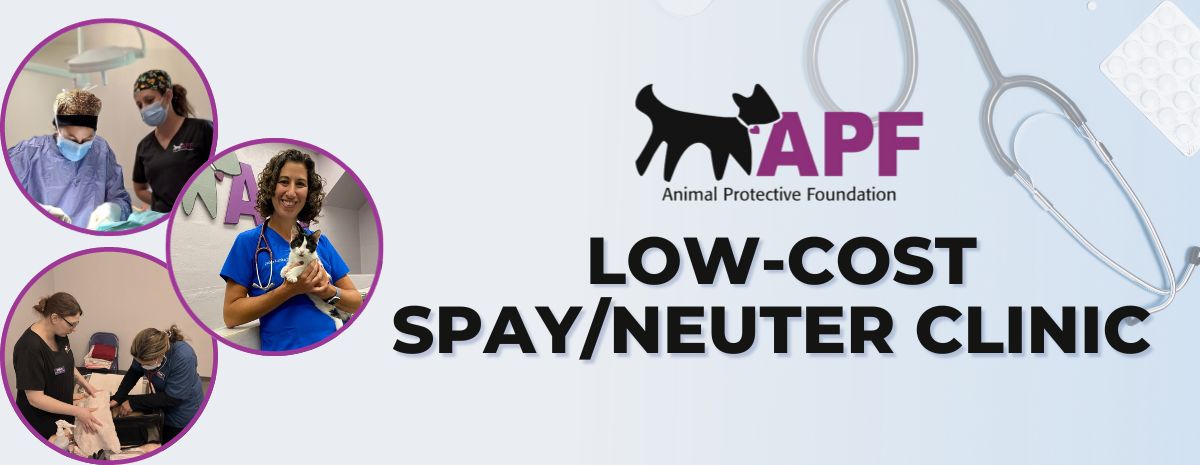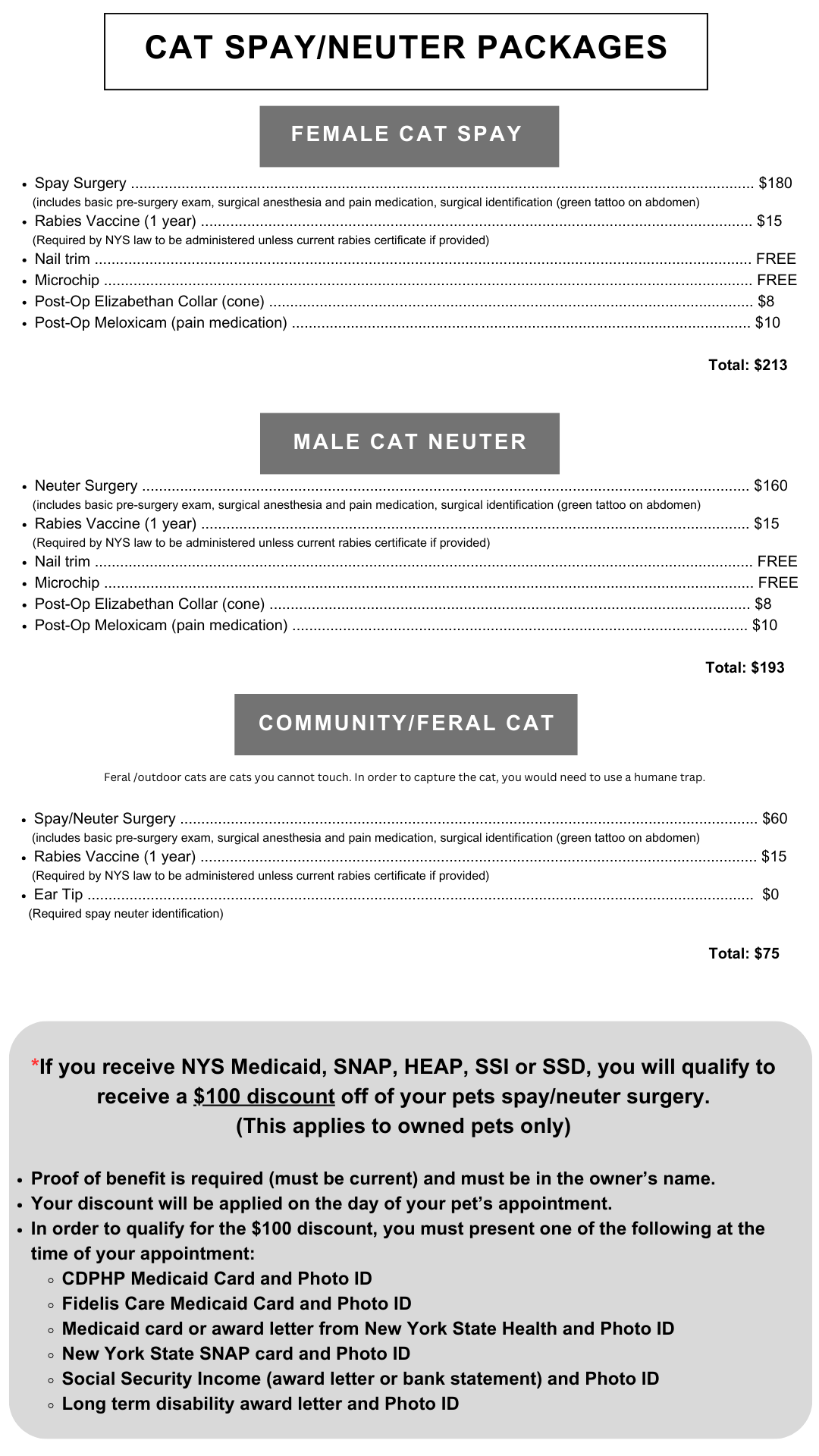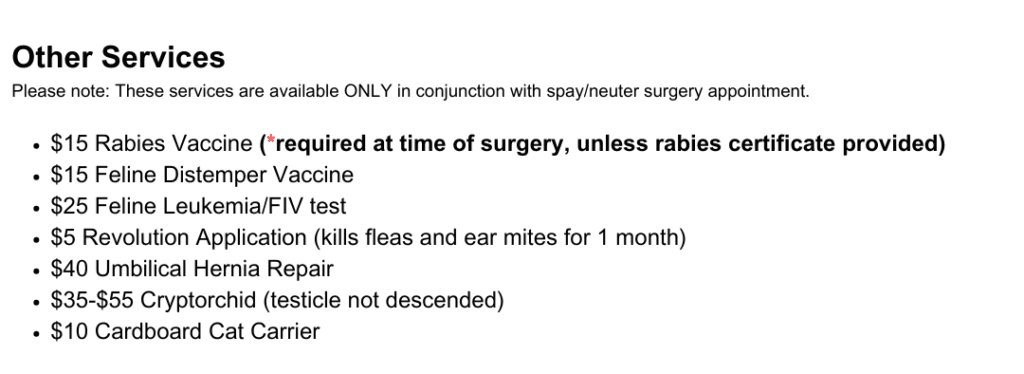APF Community Spay/Neuter Clinic
Our beautiful, state-of the-art surgical center enables us to further our commitment to providing access to affordable, high-volume, high-quality, spay/neuter services with the goal of reducing the number of unplanned pets in our community. We provide compassionate care by licensed and skilled veterinary professionals using quality instruments and supplies. There are significant health benefits to ensuring your pet is spayed/neutered.
This program is intended for those who cannot otherwise afford to have their pets altered. It also supports the work of shelters and rescue organizations and enables Good Samaritans caring for feral cats to manage them humanely and affordably. We are not a wellness clinic. Our focus is on spaying and neutering and the limited additional services we offer are only available in conjunction with surgery.
Location: 53 Maple Avenue, Glenville, NY (Located next to the APF Shelter)
Hours of Operation: Monday-Thursday 8:00 am-4:30 pm (Closed: Fridays, Saturdays & Sundays)
Phone: (518) 374-3944, ext. 107 | Fax: (518) 982-5246 | Email: apfclinic@animalprotetive.org
We are unable to accept walk-ins. All appointments must be requested online through our online appointment portal (located under the cat and dog tabs).
Our lobby is closed to walk-in traffic. Please do not visit the clinic without an appointment.
Lobby space is limited during appointment check-in and check-out times. We ask that you limit the number of people in your party to only those needed for the appointment; in most cases, that will be one person per pet.
Clients should not come to the spay/neuter clinic if they are experiencing any symptoms of illness. We will work with you to reschedule or coordinate sending a family member or friend in your place.
Please note that due to high demand our phone lines may be busy. Please leave a message and your call will be returned as soon as possible.
br
br
Spay/Neuter Surgery for Cats
br
Pet Cats
Pet cats are cats you can touch, whether the cat belongs to you, is a friendly stray, or lives in a barn. If you can pick the cat up and put her in a carrier, we consider her a pet cat.
br
Community/Feral Cats (Outdoor)
Feral, outdoor cats are cats you cannot touch. In order to capture the cat, you would need to use a humane trap. Note that this category does not include friendly stray cats.
br
Services and Fees
Prices subject to changebr
These services/prices are for owned cats only. All healthy cats over the age of 12 weeks and weighing at least 3 pounds are eligible for surgery.
Make an Appointment
An appointment is required for all cat surgeries. In order to request your appointment you are required to pay a non-refundable deposit amount of $50 (the deposit will be applied to services on the day of your pets appointment).
You may request up to 3 appointments per day. Each appointment will need to be requested separately. If you have more than 3 pets you will need to submit another request for a different day.
Please note, we are currently scheduling spay or neuter surgeries for two months out. We do not have a waitlist/cancellation list.
When requesting an appointment for a Feral/Community cat, please select the Feral/Community Cat Package for their services.
Email us at apfclinic@animalprotective.org with any questions.
br
BEFORE SURGERY INSTRUCTIONS
- Your cat must be in good health.
- Cats over 4 months of age: No food after midnight the night before surgery.
- Kittens (3-4 months of age): 1/3 portion of meal up to 6am the morning of surgery.
- Cat drop-off is at 7:45 am. Late arrivals will need to be rescheduled. *(discharge is same day at 3:45pm)
- All cats must be safely restrained in individual carriers.
- All outdoor feral/community cats must arrive in a covered humane (Have-A-Hart) trap.
- Payment is due at time of drop-off. We accept cash, credit card and debit cards. We do not accept checks or Care Credit.
-
FEMALE CATS- PLEASE READ
What is a cat heat cycle?
A heat cycle refers to a female cat’s reproductive hormone cycle. Cats are induced ovulators, which means they do not ovulate (pass an egg) unless they are bred/mated. Cats do not typically have vaginal bleeding with their heat cycle, so it can be hard to tell for sure if they are in heat.
Cats can have their first heat cycle as early as 4 months old, so it is important to have your cat spayed as soon as possible. During the heat cycle, the cat will allow breeding from males, and they show some pretty classic behaviors, including rolling, excessive rubbing against objects, keeping her tail to the side, and yowling loudly. While sometimes cats that are not in heat will exhibit similar behaviors, a cat in heat will show a significant uptick in the frequency and intensity of these behaviors.
Cat heat behaviors can last between 3-20 days and can repeat in 10-40 days if she is not bred. Cat heat cycles occur more frequently in the breeding season, from February to October.
Is it safe to have my cat spayed during her heat cycle?
Hormonal changes from the heat cycle cause the tissues of the uterus and the blood vessels to enlarge and expand, which does mean that extra care needs to be taken when handling the organs during surgery.
Luckily, the veterinarians at the Animal Protective Foundation are very experienced and skilled at performing spay operations at any time of a cat’s cycle, including during heat. Actually, during breeding season, often most or all of the cats are in heat at surgery!
If you suspect that your cat is in heat at the time of her surgery appointment, you do not need to alert APF, her surgery can continue as planned.
br
REASONS FOR REFUSAL OF SURGERY
Our veterinarians perform a general physical examination on every patient prior to surgery and reserve the right to refuse service to any animal for which surgery is deemed a health risk.
br
Reasons for refusal may include, but are not limited to:
- Animals who clinic staff cannot safely handle.
- Animals on medications for anxiety, long term conditions, etc. (At DVM’s Discretion)
- Feral cats who are brought in any container except a humane Have-A-Hart trap.
- Animals with known health issues, such as a heart murmur, may be referred to a full-service veterinary hospital.
- Dogs who are nursing. Adult dogs under 5 Lbs. or over 90 Lbs.
- Animals showing any signs of illness such as coughing, sneezing, runny eyes, or diarrhea.
- Kittens younger than 12 weeks OR smaller than 3 pounds.
*If any of these situations apply to your animal, please discuss this with a clinic staff member before your appointment. We may be able to make special arrangements if we know the issue in advance. This is for the safety of your animals and our staff.
Spay/Neuter Surgery for Dogs
br
Prices subject to change.br
All healthy dogs over the age of 12 weeks and weighing at least 5 pounds are eligible for surgery.
b
b
br
Make an Appointment
Please read all the “Online Scheduling Notes” below before clicking the “Book an Appointment” button below.
A $100 non-refundable deposit is required for Spay/Neuter appointments, payable when you schedule the appointment. Your deposit will be applied to your service fees the day of your appointment. The remainder of your payment is due during check-in on the day of your appointment.
Please note we are currently scheduling spay or neuter surgeries for two months out.
Online Scheduling Notes
- Currently we book up to two months in advance and appointments fill very quickly, new appointment dates are added on a weekly basis.
- Fields with an asterisk (*) are required and must be filled in order to submit your request.
- Pre-surgical bloodwork is REQUIRED for dogs 8 years +. Bloodwork will need to be completed with your vet and sent to the clinic for review before requesting an appointment for spay/neuter.
- Van Willebrand Testing– This test is required for any dog that is of Doberman breed prior to surgery. This test checks for a blood clotting disorder common in the breed that can severely increase bleeding risk during surgery. It will help us identify and prepare the safest way for your dog to be spayed/neutered. This test needs to be performed at a regular veterinarian’s office with results available prior to surgery at APF.
- Brachycephalic Dog Breeds– Any mixed or purebred brachycephalic breeds will be charged a fee ($12-$31) for an anti-nausea injection called Cerenia. This injection helps treat/prevent vomiting and nausea in our surgical patients. It will be given prior to surgery to help reduce the risk of aspiration after surgery. Brachycephalic breeds are at additional risk for complications with anesthesia after a surgical procedure due to the structure of their snout and while reducing nausea can decrease the risks, it cannot eliminate them. Brachycephalic breeds can include Bulldogs (French and English), Boxer Dogs, Boston Terriers, Pekingese, Chinese Shar-Pei, Pugs, Lhasa Apsos, Shih Tzus, and Bull Mastiffs.
-
IMPORTANT: For the protection of all pets in the clinic, dogs are REQUIRED to be current on their DA2PP vaccine (distemper/parvo). If your dog has never received a DA2PP vaccine, you are REQUIRED to bring them to your regular vet or vaccine clinic (i.e. Tractor Supply Pet Vet) and have one administered between 3-4 weeks prior to your spay/neuter appointment date.
-
If needed, rabies vaccines can be provided by the APF on the day of surgery.
- If you are scheduling multiple dogs, please know that our surgery schedule may not be able to accommodate having your pets scheduling on the same day. Please check availability online.
br
Email us at apfclinic@animalprotective.org with any questions.
Fax: 518-982-5246
br
BEFORE SURGERY INSTRUCTIONS
- Your dog must be in good health.
- Dogs 5 months and older- No food after midnight the night before surgery.
- Puppies 3-4 months old- Feed a 1/3 portion of meal up to 6am the morning of surgery
- Dog drop-off is at 8:15 am. Please leave your dog in the car when you arrive and proceed inside the clinic to check-in. Late arrivals will need to be rescheduled. *(discharge is same day between 3:15pm -3:30pm)
- All dogs must be safely restrained on a leash.
- Payment is due at time of drop-off. We accept cash, VISA, MasterCard, Discover and debit cards. We do not accept checks or Care Credit.
-
FEMALE DOGS- PLEASE READ
A heat cycle, or a dog being “in season” both refer to a female dog’s reproductive hormone cycle, and is an indication of her body readying itself for mating and pregnancy. Female dogs have a heat cycle about every 6 months. The timing of the first heat cycle depends on genetics, including the size of the dog, and some environmental factors. In general, small breed dogs typically have their first heat earlier than large breed dogs; 6-9 months old is typical for small breed and 8-12 months old for large breed dogs, though this can vary among individual dogs.
Signs of a heat cycle include swelling of the vulva, enlarged nipples, and bloody vaginal discharge, which can last from 7-20 days. Some dogs barely bleed at all, so it can be easy to miss, especially with longer haired breeds. During this time the female will not typically allow mating from a male dog. However, the following 5-10 day period is the most fertile time for the dog, as it is when ovulation occurs. It is when the bleeding decreases and the female will allow mating and potentially get pregnant.
Is it safe to have my dog spayed during her heat cycle?
Hormonal changes from the heat cycle cause the tissues of the uterus and the blood vessels to enlarge and expand, which does mean that extra care needs to be taken when handling the organs during surgery.
Luckily, the veterinarians at the Animal Protective Foundation are very experienced and skilled at performing spay operations at any time of a dog’s cycle, including during heat. Occasionally in very large or overweight dogs, the APF vet may elect to wait until a dog has completed her heat cycle before spaying her, but in most cases APF recommends going forward with the spay procedure.
You do not need to alert APF ahead of time if your dog goes into heat around the time of her surgery appointment.
If your dog is spayed during her heat cycle, she may experience some additional blood-tinged discharge from her vulva for a few extra days following the surgery, but this should be limited.
br
REASONS FOR REFUSAL OF SURGERY
Our veterinarians perform a general physical examination on every patient prior to surgery and reserve the right to refuse service to any animal for which surgery is deemed a health risk.
br
Reasons for refusal may include, but are not limited to:
- Animals who clinic staff cannot safely handle.
- Animals on medications for anxiety, long term conditions, etc. (At DVM’s Discretion)
- Feral cats who are brought in any container except a humane Have-A-Hart trap.
- Animals with known health issues, such as a heart murmur, may be referred to a full-service veterinary hospital.
- Dogs who are nursing. Adult dogs under 5 Lbs. or over 90 Lbs.
- Animals showing any signs of illness such as coughing, sneezing, runny eyes, or diarrhea.
- Kittens younger than 12 weeks OR smaller than 3 pounds.
*If any of these situations apply to your animal, please discuss this with a clinic staff member before your appointment. We may be able to make special arrangements if we know the issue in advance. This is for the safety of your animals and our staff.
Support the Clinic
Contributions to the Community Spay/Neuter Fund and donations of supplies are greatly appreciated and enable us to help more animals.









